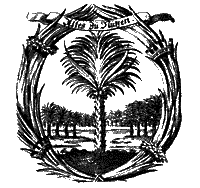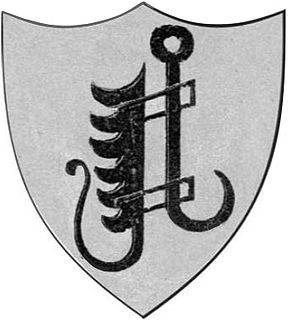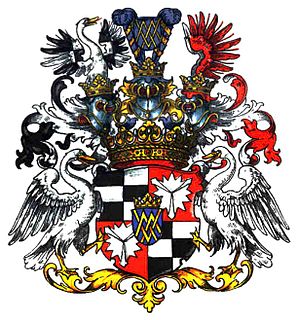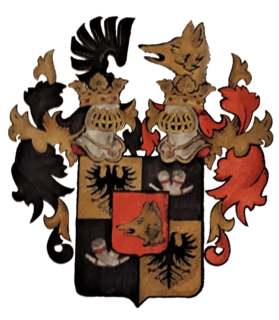
Swedish Pomerania was a Dominion under the Swedish Crown from 1630 to 1815, situated on what is now the Baltic coast of Germany and Poland. Following the Polish War and the Thirty Years' War, Sweden held extensive control over the lands on the southern Baltic coast, including Pomerania and parts of Livonia and Prussia.

Prince Gustav Vasa, Count Itterburg, born Crown Prince of Sweden and later called Gustaf Gustafsson von Holstein-Gottorp, Prince of Vasa, was the son of King Gustav IV Adolf of Sweden and Queen Frederica. His Austrian princely title was actually spelled Wasa.

Demmin is a town in the Mecklenburgische Seenplatte district, Mecklenburg-Western Pomerania, Germany. It was the capital of the former district of Demmin.

The Prince-Bishopric of Würzburg was an ecclesiastical principality of the Holy Roman Empire located in Lower Franconia west of the Prince-Bishopric of Bamberg. Würzburg had been a diocese since 743. As definitely established by the Concordat of 1448, bishops in Germany were chosen by the canons of the cathedral chapter and their election was later confirmed by the pope. Following a common practice in Germany, the prince-bishops of Würzburg were frequently elected to other ecclesiastical principalities as well. The last few prince-bishops resided at the Würzburg Residence, which is one of the grandest baroque palaces in Europe.

The Fruitbearing Society was a German literary society founded in 1617 in Weimar by German scholars and nobility. Its aim was to standardize vernacular German and promote it as both a scholarly and literary language, after the pattern of the Accademia della Crusca in Florence and similar groups already thriving in Italy, followed in later years also in France (1635) and Britain.

Jerichow is a town on the east side of the Elbe River, in the District of Jerichower Land, of the state of Saxony-Anhalt in Germany. With about 270 square kilometers, the collective municipality of the city of Jerichow is one of the largest municipalities in area size in Germany.

Cornberg is a community in Hersfeld-Rotenburg district in northeastern Hesse, Germany. It is the district's smallest municipality.

Molsberg is an Ortsgemeinde – a community belonging to a Verbandsgemeinde – in the Westerwaldkreis in Rhineland-Palatinate, Germany.
The County of Gützkow was a part of the Duchy of Pomerania during the High Middle Ages (1219–1359), named after the central town of Gützkow and stretching roughly from the Peene River in the South to the Ryck River in the North. It emerged from the earlier Liutician Principality of Gützkow, that was turned into a castellany when subdued by the Dukes of Pomerania. When the last Count of Gützkow died in 1359, the area was turned into a Vogtei, which was merged into Amt Wolgast in the beginning 16th century.

Prittwitz is the name of a Silesian noble family of the Wczele coat of arms, whose first documented member is one Petrus de Prawticz from 1283.

For other Bibra and Bibran entries, go to Bibra (disambiguation).

The Dressel family history begins with Benedictvs de Benehvsin who lived in the middle of the 11th Century. He was a free noble vassal of the abbot of Hersfeld monastery in Hessen. He gave his first name to his estate, which was originally called Benehusin and later called Bennenhus, Beinhausen, Benhausen, etc. Today it is called Beenhausen. It is located in the hill and forest area of Northeastern Hessen, between Fulda and Schwalm in the Gemeinde Ludwigsau on the stream called Rohrbach, in the former Landkreis Rotenburg.
Rademacher is a Rhenish family of ancient nobility, that has its roots in the village of Rodemack in Lorraine. They also settled in Middelburg, Netherlands and in the latter also in North Rhine-Westphalia (Aachen), East Prussia (Tilsit), Latvia (Riga) and Hesse (Frankfurt).
Francis Henry of Saxe-Lauenburg was a Prince of Saxe-Lauenburg

von der Decken is a Hanoverian family of German nobility. Since more than 750 years the center of the family is in a part of Lower Saxony at the south bank of the river Elbe called Kehdingen.

Merveldt is the name of a Westphalian noble family, which belongs to the nobility of the Middle Ages. The Herrn [Lords] von Merveldt were among the oldest families in the Münsterland. Merfeld, the eponymous seat of the family, is now a neighborhood of the city of Dülmen in the District of Coesfeld in the state of North Rhine-Westphalia in Germany.

John F. Huenergardt (1875–1955) was one of the pioneers of the Southeastern-European Adventism, a Seventh-day Adventist minister, teacher, administrator.
Friedrich Wilhelm Ferdinand Ernst Heinrich von Forcade de Biaix, aka Ferdinand von Forcade, Royal Prussian Major and Knight of the Iron Cross 2nd Class.

Fenrich was an Austrian lower nobility family of German origin, a branch of the House of Fenner. The family flourished in the late 18th century in Meseritz in South Prussia and moved to Austria-Hungary in the 19th century.
von Santen / Zanten is the name of a German noble family from the Rhineland. One of the oldest extant German aristocratic families, they belong to the Uradel of the Prince-Bishopric of Münster.



![(von) Reck] family Coat of Arms Noble Family (von) Reck.png](http://upload.wikimedia.org/wikipedia/commons/thumb/4/40/Coat_of_Arms_Noble_Family_%28von%29_Reck.png/330px-Coat_of_Arms_Noble_Family_%28von%29_Reck.png)


























